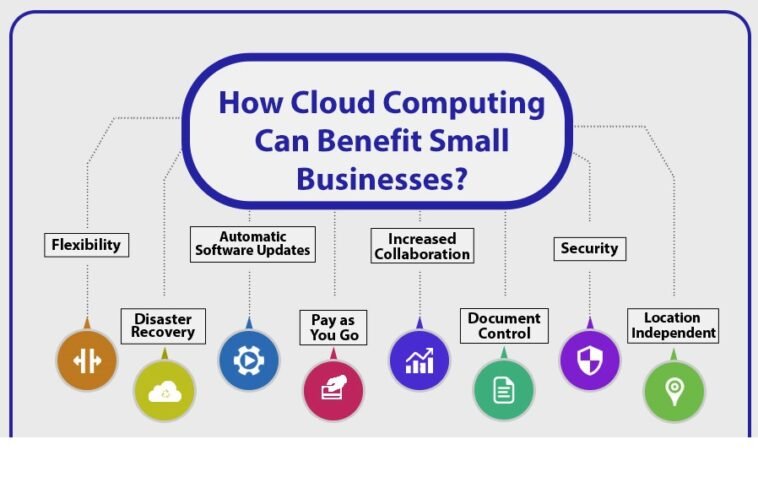In today’s fast-paced and technology-driven world, businesses face increasing demands for efficiency, agility, and cost-effectiveness. Advantages of Cloud Computing for Business provides a solution that meets these demands by offering on-demand access to computing resources, storage, and software applications over the internet. Rather than relying on traditional on-premises infrastructure, businesses can harness the power of the cloud to streamline their operations and achieve greater success.
Cost Savings and Efficiency
Table of Contents
- 1 Cost Savings and Efficiency
- 2 Scalability and Flexibility
- 3 Enhanced Security and Data Protection
- 4 Cloud Computing for Business Improved Collaboration
- 5 Disaster Recovery and Business Continuity
- 6 Cloud Computing for Business Competitive Advantage and Innovation
- 7 Conclusion Cloud Computing for Business
- 8 FAQs Cloud Computing for Business
- 8.1 How can cloud computing save costs for businesses?
- 8.2 Can cloud computing help businesses scale their resources?
- 8.3 Is cloud computing secure for storing sensitive business data?
- 8.4 How does cloud computing enable collaboration among remote teams?
- 8.5 How can cloud computing help businesses recover from disasters?
One of the primary advantages of Cloud Computing for Business is the potential for significant cost savings. With cloud services, businesses can eliminate the need for large upfront investments in hardware and software. Instead, they can adopt a pay-as-you-go model, where costs are based on actual usage. This allows businesses to scale their resources up or down as needed, optimizing cost efficiency and avoiding unnecessary expenses. Additionally, cloud computing reduces the need for on-site IT infrastructure, maintenance, and personnel, further lowering operational costs.
Scalability and Flexibility
Cloud Computing for Business offers unparalleled scalability and flexibility, empowering businesses to adapt to changing needs and market conditions. With traditional infrastructure, scaling up resources often involves significant time, effort, and cost. In contrast, cloud services allow businesses to quickly and easily allocate additional resources or downgrade when demand decreases. This flexibility enables organizations to respond swiftly to market opportunities, handle sudden surges in traffic, and accommodate growth without disruptions.

Enhanced Security and Data Protection
Security is a top concern for businesses in the digital age, and cloud computing provides robust solutions to safeguard sensitive data. Cloud Computing for Business service providers invest heavily in state-of-the-art security measures, including encryption, access controls, and regular security updates. These measures often surpass the security capabilities of individual businesses, making the cloud a secure choice for storing and managing data. Furthermore, cloud-based backups and disaster recovery options ensure that businesses can recover their data in case of any unforeseen events.
Cloud Computing for Business Improved Collaboration
Cloud computing enables seamless collaboration among teams, regardless of their physical locations. Through cloud-based tools and applications, employees can work together on projects in real-time, share files, and communicate effectively. This enhanced collaboration drives productivity and innovation within organizations. Moreover, cloud services provide accessibility to data and applications from anywhere, at any time, as long as there is an internet connection. This flexibility allows employees to work remotely and ensures uninterrupted productivity.

Disaster Recovery and Business Continuity
In the face of natural disasters, system failures, or cyber-attacks, business continuity is of paramount importance. Cloud computing offers robust disaster recovery solutions that help businesses quickly recover their systems and resume operations. By storing data and applications in the cloud, organizations can avoid data loss and minimize downtime. Cloud Computing for Business providers replicate data across multiple servers and locations, ensuring redundancy and resilience. This proactive approach to disaster recovery strengthens the overall resilience of businesses.
Cloud Computing for Business Competitive Advantage and Innovation
Embracing cloud computing can provide businesses with a competitive edge in their respective industries. By leveraging the cloud’s capabilities, organizations can rapidly deploy new applications, services, and features, enabling faster time-to-market and innovation. The scalability and agility of the cloud empower businesses to experiment, test ideas, and iterate quickly, fostering a culture of innovation. Cloud computing also enables businesses to tap into advanced technologies such as artificial intelligence, machine learning, and big data analytics, further enhancing their competitive advantage.

Conclusion Cloud Computing for Business
Cloud computing has emerged as a game-changer for businesses, offering numerous advantages that drive growth, efficiency, and innovation. From cost savings and scalability to enhanced security and collaboration, the cloud provides a robust and flexible infrastructure for businesses to thrive in the digital era. By harnessing the power of cloud computing, businesses can achieve operational excellence, gain a competitive edge, and unlock their full potential.
ReadMore: The Best Practices for Cloud Security: A Guide
FAQs Cloud Computing for Business
How can cloud computing save costs for businesses?
Cloud computing offers cost savings by eliminating large upfront investments, adopting a pay-as-you-go model, and reducing the need for on-site IT infrastructure and maintenance.
Can cloud computing help businesses scale their resources?
Yes, cloud computing provides unparalleled scalability, allowing businesses to quickly allocate additional resources or downgrade as per their needs.
Is cloud computing secure for storing sensitive business data?
Cloud service providers invest heavily in security measures, surpassing the capabilities of most individual businesses. Encryption, access controls, and regular security updates ensure data protection.
How does cloud computing enable collaboration among remote teams?
Cloud-based tools and applications facilitate real-time collaboration, file sharing, and effective communication, enabling teams to work together regardless of their physical locations.
How can cloud computing help businesses recover from disasters?
Cloud computing offers robust disaster recovery solutions by storing data across multiple servers and locations, ensuring redundancy and quick system recovery.
ReadMore: Exploring Thin Client Solutions: Streamlining Computing Infrastructure




